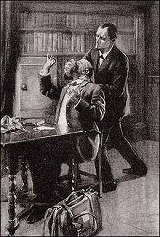“Well, you nearly had a worse one, for I believe they are not far off me.”
“You don’t mean that!”
“Sure thing. My landlady down Fratton way had some inquiries, and when I heard of it I guessed it was time for me to hustle. But what I want to know, mister, is how the coppers know these things? Steiner is the fifth man you’ve lost since I signed on with you, and I know the name of the sixth if I don’t get a move on. How do you explain it, and ain’t you ashamed to see your men go down like this?”
Von Bork flushed crimson.
“How dare you speak in such a way!”
“If I didn’t dare things, mister, I wouldn’t be in your service. But I’ll tell you straight what is in my mind. I’ve heard that with you German politicians when an agent has done his work you are not sorry to see him put away.”
Von Bork sprang to his feet.
“Do you dare to suggest that I have given away my own agents!”
“I don’t stand for that, mister, but there’s a stool pigeon or a cross somewhere, and it’s up to you to find out where it is. Anyhow I am taking no more chances. It’s me for little Holland, and the sooner the better.”
Von Bork had mastered his anger.
“We have been allies too long to quarrel now at the very hour of victory,” he said. “You’ve done splendid work and taken risks, and I can’t forget it. By all means go to Holland, and you can get a boat from Rotterdam to New York. No other line will be safe a week from now. I’ll take that book and pack it with the rest.”
The American held the small parcel in his hand, but made no motion to give it up.
“What about the dough?” he asked.
“The what?”
“The boodle. The reward. The £500. The gunner turned damned nasty at the last, and I had to square him with an extra hundred dollars or it would have been nitsky for you and me. ‘Nothin’ doin’!’ says he, and he meant it, too, but the last hundred did it. It’s cost me two hundred pound from first to last, so it isn’t likely I’d give it up without gettin’ my wad.”
Von Bork smiled with some bitterness. “You don’t seem to have a very high opinion of my honour,” said he, “you want the money before you give up the book.”
“Well, mister, it is a business proposition.”
“All right. Have your way.” He sat down at the table and scribbled a check, which he tore from the book, but he refrained from handing it to his companion. “After all, since we are to be on such terms, Mr. Altamont,” said he, “I don’t see why I should trust you any more than you trust me. Do you understand?” he added, looking back over his shoulder at the American. “There’s the check upon the table. I claim the right to examine that parcel before you pick the money up.”
The American passed it over without a word. Von Bork undid a winding of string and two wrappers of paper. Then he sat gazing for a moment in silent amazement at a small blue book which lay before him. Across the cover was printed in golden letters Practical Handbook of Bee Culture. Only for one instant did the master spy glare at this strangely irrelevant inscription. The next he was gripped at the back of his neck by a grasp of iron, and a chloroformed sponge was held in front of his writhing face.

“Another glass, Watson!” said Mr. Sherlock Holmes as he extended the bottle of Imperial Tokay.
The thickset chauffeur, who had seated himself by the table, pushed forward his glass with some eagerness.
“It is a good wine, Holmes.”
“A remarkable wine, Watson. Our friend upon the sofa has assured me that it is from Franz Josef’s special cellar at the Schoenbrunn Palace. Might I trouble you to open the window, for chloroform vapour does not help the palate.”